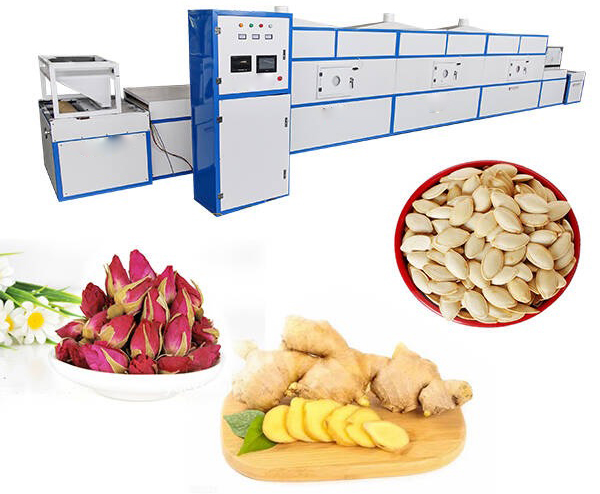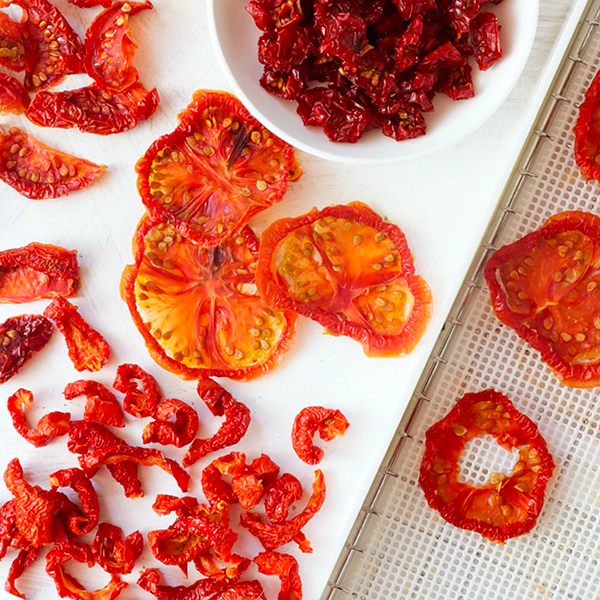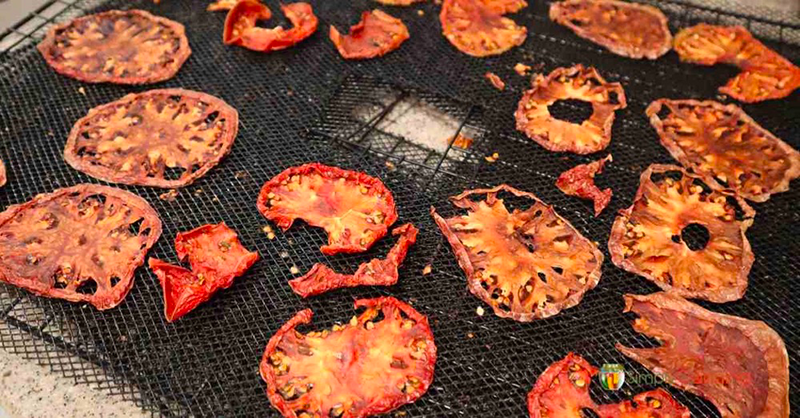
Content Menu
● Understanding Penetration Type Dryers
>> Key Features of Penetration Type Dryers
● Maximizing Efficiency with Penetration Type Dryers
>> 1. Optimize Product Stacking
>> 2. Fine-tune Temperature Settings
>> 3. Leverage the Dehumidification Function
>> 4. Implement Batch Scheduling
>> 5. Regular Maintenance and Cleaning
● Case Studies: Success with Penetration Type Dryers
>> Nut Processing Company
>> Spice Manufacturer
● Advanced Techniques for Maximizing Efficiency
>> Integration of IoT and AI
>> Energy Recovery Systems
>> Continuous Flow Systems
● Environmental Benefits of Efficient Drying
● Training and Skill Development
● Data-Driven Decision Making
● Future Trends in Food Drying Technology
● Enhancing Product Quality through Precise Drying
>> Preserving Nutritional Value
>> Maintaining Flavor Profiles
>> Improving Texture and Appearance
● Customizing Dryer Configurations for Specific Products
● Implementing Quality Control Measures
● Addressing Challenges in Scaling Production
● Conclusion
● Frequently Asked Questions
>> 1. What types of food products are best suited for penetration type dryers?
>> 2. How do penetration type dryers compare to traditional drying methods in terms of energy efficiency?
>> 3. What maintenance procedures are essential for ensuring the longevity and efficiency of a penetration type dryer?
>> 4. How can food manufacturers integrate penetration type dryers into their existing production lines?
>> 5. What future developments can we expect in penetration type dryer technology?
● Citations:
In today's competitive food processing industry, maximizing production efficiency is crucial for success. One of the most effective ways to achieve this is by utilizing advanced drying technology, specifically penetration type dryers. These innovative machines have revolutionized the food drying process, offering unparalleled efficiency and quality. In this comprehensive guide, we'll explore how to maximize production efficiency with a penetration type dryer, providing valuable insights for food manufacturers looking to optimize their operations.

Understanding Penetration Type Dryers
Penetration type dryers are cutting-edge machines designed to efficiently dry a wide range of food products. These dryers utilize a patented half vacuum air duct design, allowing for even drying of stacked products. This unique feature sets them apart from traditional dryers, offering several advantages in terms of efficiency and product quality.
Key Features of Penetration Type Dryers
1. Energy Efficiency: Penetration type dryers use only 25% of the electricity required by traditional dryers, significantly reducing energy costs.
2. Adjustable Temperature Control: These machines offer temperature settings ranging from 18°C to 80°C, allowing for precise control over the drying process.
3. Versatility: Suitable for drying various products including nuts, spices, seeds, beans, and more.
4. Large Capacity: Can handle capacities ranging from 300 kg to 10 tons, making them suitable for both small and large-scale operations.
5. Dehumidification Function: Helps maintain a controlled humidity environment, essential for preventing moisture-related spoilage.
Maximizing Efficiency with Penetration Type Dryers
To truly maximize production efficiency with a penetration type dryer, it's essential to implement best practices and leverage the machine's unique features. Here are some key strategies:
1. Optimize Product Stacking
One of the primary advantages of penetration type dryers is their ability to dry stacked products evenly. To maximize this benefit:
- Arrange products in uniform layers to ensure consistent airflow
- Use stackable trays or containers designed for optimal air circulation
- Experiment with different stacking heights to find the most efficient configuration for each product type
2. Fine-tune Temperature Settings
The adjustable temperature control of penetration type dryers allows for precise drying conditions. To optimize efficiency:
- Determine the ideal drying temperature for each product type through testing
- Create temperature profiles for different products to ensure consistent quality
- Gradually adjust temperatures during the drying process to maximize efficiency without compromising product quality
3. Leverage the Dehumidification Function
Proper humidity control is crucial for efficient drying and product quality. To make the most of the dehumidification function:
- Monitor and adjust humidity levels throughout the drying process
- Use lower humidity settings for products that require longer drying times
- Implement humidity sensors to automate adjustments and maintain optimal conditions
4. Implement Batch Scheduling
Efficient batch scheduling can significantly improve overall production efficiency. Consider the following:
- Group similar products with comparable drying requirements
- Schedule longer drying cycles during off-peak energy hours to reduce costs
- Use data analytics to optimize batch sizes and drying times
5. Regular Maintenance and Cleaning
To ensure consistent performance and maximize efficiency:
- Develop a regular maintenance schedule for all components
- Clean air ducts and filters regularly to maintain optimal airflow
- Train staff on proper cleaning and maintenance procedures

Case Studies: Success with Penetration Type Dryers
Nut Processing Company
A leading nut processing company implemented penetration type dryers to improve their drying efficiency. By switching from traditional drying methods, they achieved a 30% reduction in energy costs and increased their production capacity by 20%. This allowed them to expand their product offerings and enter new markets.
Spice Manufacturer
A spice manufacturer utilized penetration type dryers to dry a variety of spices, including cardamom and cloves. The adjustable temperature control allowed them to preserve the delicate flavors and aromas of the spices, resulting in higher quality products. This improvement in product quality led to increased customer satisfaction and loyalty.
Advanced Techniques for Maximizing Efficiency
Integration of IoT and AI
The future of food drying lies in the integration of smart technologies. By incorporating IoT sensors and AI algorithms, manufacturers can:
- Monitor drying conditions in real-time
- Predict maintenance needs before breakdowns occur
- Optimize drying parameters automatically based on product type and environmental conditions
Energy Recovery Systems
To further enhance energy efficiency:
- Implement heat recovery systems to capture and reuse waste heat
- Explore renewable energy sources to power the dryers, reducing operational costs and environmental impact
Continuous Flow Systems
For high-volume production:
- Consider implementing continuous flow drying systems
- Use conveyor belts to move products through different drying zones
- Automate product loading and unloading to minimize downtime
Continuous Flow Drying System
Environmental Benefits of Efficient Drying
Maximizing production efficiency with penetration type dryers not only improves the bottom line but also contributes to environmental sustainability:
- Reduced energy consumption leads to lower carbon emissions
- Efficient drying processes minimize food waste
- Compact design of penetration type dryers reduces the overall factory footprint
Training and Skill Development
To fully leverage the capabilities of penetration type dryers:
- Invest in comprehensive training programs for operators
- Develop standard operating procedures for different product types
- Encourage continuous learning and improvement among staff
Data-Driven Decision Making
Implement data collection and analysis systems to:
- Track key performance indicators (KPIs) related to drying efficiency
- Identify bottlenecks and areas for improvement
- Make informed decisions about process optimizations
Future Trends in Food Drying Technology
As technology continues to evolve, we can expect to see:
- More advanced materials used in dryer construction for improved heat distribution
- Integration with other food processing equipment for seamless production lines
- Development of hybrid drying systems that combine multiple drying technologies
Enhancing Product Quality through Precise Drying
One of the key advantages of penetration type dryers is their ability to enhance product quality through precise drying. This is particularly important for delicate food products that require careful handling to preserve their nutritional value, flavor, and appearance.
Preserving Nutritional Value
Penetration type dryers allow for lower drying temperatures compared to traditional methods. This gentle drying process helps preserve heat-sensitive vitamins and nutrients, resulting in a higher quality end product. For example, when drying fruits and vegetables, the retention of vitamins C and A is significantly improved using penetration type dryers.
Maintaining Flavor Profiles
For spices and herbs, maintaining the essential oils responsible for their unique flavors is crucial. Penetration type dryers offer precise temperature and humidity control, allowing manufacturers to create optimal conditions for preserving these volatile compounds. This results in dried spices and herbs that retain more of their natural flavor and aroma compared to those dried using conventional methods.
Improving Texture and Appearance
The even drying provided by penetration type dryers helps maintain the desired texture of dried foods. For example, when drying nuts, the uniform heat distribution prevents over-drying of the outer layers while ensuring the core is properly dried. This results in a consistent texture throughout the product, enhancing the overall quality and consumer experience.
Customizing Dryer Configurations for Specific Products
To maximize efficiency, it's essential to customize the dryer configuration based on the specific requirements of different food products. This may involve:
- Adjusting tray designs to optimize airflow for particular product shapes and sizes
- Implementing specialized loading and unloading systems for delicate or oddly shaped items
- Creating product-specific drying programs that adjust temperature and humidity over time
By tailoring the drying process to each product, manufacturers can achieve optimal results in terms of both efficiency and quality.
Implementing Quality Control Measures
To ensure consistent product quality and maximize efficiency, implementing robust quality control measures is crucial. This may include:
- Regular sampling and testing of dried products to verify moisture content and quality parameters
- Using infrared cameras to detect hot spots or uneven drying within the dryer
- Implementing statistical process control to monitor and improve drying consistency over time
Addressing Challenges in Scaling Production
As food manufacturers look to increase production capacity, scaling up operations with penetration type dryers presents both opportunities and challenges. Some key considerations include:
- Designing modular drying systems that can be easily expanded as production needs grow
- Implementing advanced automation systems to maintain efficiency at larger scales
- Developing strategies for managing increased energy demands and heat generation
By carefully planning for scalability, manufacturers can ensure that the benefits of penetration type dryers are maintained as production volumes increase.
Conclusion
Maximizing production efficiency with a penetration type dryer is a multifaceted process that requires a combination of technological innovation, strategic planning, and operational excellence. By leveraging the unique features of these advanced dryers, implementing best practices, and staying abreast of emerging trends, food manufacturers can significantly enhance their production efficiency, reduce costs, and improve product quality.
The penetration type dryer represents a significant leap forward in food drying technology, offering unparalleled energy efficiency, versatility, and precision. As the food industry continues to evolve, those who embrace and master this technology will be well-positioned to meet the growing demands of consumers while maintaining a competitive edge in the market.
By focusing on optimizing product stacking, fine-tuning temperature settings, leveraging dehumidification functions, implementing efficient batch scheduling, and maintaining equipment properly, manufacturers can unlock the full potential of penetration type dryers. Furthermore, the integration of smart technologies and continuous improvement strategies will ensure that these efficiency gains are sustained and enhanced over time.
As we look to the future, the role of penetration type dryers in maximizing production efficiency will only grow in importance. With ongoing advancements in technology and an increasing focus on sustainability, these dryers will continue to play a crucial role in shaping the future of food processing.

Frequently Asked Questions
1. What types of food products are best suited for penetration type dryers?
Penetration type dryers are ideal for a wide range of food products that can be stacked together. This includes nuts, spices, seeds, beans, pumpkin seeds, peanuts, sunflower seeds, cardamom, cloves, red pepper chili, aniseed, white and black pepper, cocoa beans, and coffee beans. The versatility of these dryers makes them suitable for various food processing applications.
2. How do penetration type dryers compare to traditional drying methods in terms of energy efficiency?
Penetration type dryers are significantly more energy-efficient than traditional drying methods. They use only 25% of the electricity required by conventional dryers. This substantial reduction in energy consumption not only leads to cost savings but also contributes to environmental sustainability by reducing the carbon footprint of food processing operations.
3. What maintenance procedures are essential for ensuring the longevity and efficiency of a penetration type dryer?
Regular maintenance is crucial for the optimal performance of penetration type dryers. Essential maintenance procedures include:
- Cleaning air ducts and filters regularly to maintain proper airflow
- Inspecting and replacing worn components as needed
- Lubricating moving parts according to the manufacturer's recommendations
- Calibrating temperature and humidity sensors periodically
- Conducting regular energy efficiency audits to ensure the dryer is operating at peak performance
Implementing a comprehensive maintenance schedule and training staff on proper maintenance techniques will help extend the lifespan of the dryer and maintain its efficiency.
4. How can food manufacturers integrate penetration type dryers into their existing production lines?
Integrating penetration type dryers into existing production lines requires careful planning and consideration of several factors:
1. Assess current production flow and identify the optimal placement for the dryer
2. Ensure proper ventilation and power supply are available at the installation site
3. Consider any necessary modifications to conveyor systems or product handling equipment
4. Implement a phased integration approach to minimize disruption to ongoing production
5. Provide comprehensive training to operators and maintenance staff
6. Develop new standard operating procedures that incorporate the use of the penetration type dryer
Working closely with the dryer manufacturer or a qualified consultant can help ensure a smooth integration process.
5. What future developments can we expect in penetration type dryer technology?
The future of penetration type dryer technology is likely to include several exciting developments:
- Integration of artificial intelligence and machine learning for automated optimization of drying parameters
- Advanced sensor technology for more precise control of temperature, humidity, and airflow
- Development of hybrid systems that combine penetration drying with other drying technologies for enhanced efficiency
- Improved energy recovery systems to further reduce energy consumption
- Use of sustainable materials in dryer construction to enhance environmental performance
- Integration with blockchain technology for improved traceability and quality assurance in food processing
These advancements will continue to improve the efficiency, versatility, and sustainability of penetration type dryers, further solidifying their role in maximizing production efficiency in the food processing industry.
Citations:
[1] https://www.dryeratech.com/cost-effective-solutions-investing-in-a-penetration-type-dryer.html
[2] https://www.dryeratech.com/key-features-of-penetration-type-dryer-machines-explained.html
[3] https://onecpm.com/success-story/efficiency-flexibility-growth-snack-food-manufacturers-choose-triple-pass-dryer
[4] https://www.aimheatpump.com/products-78591
[5] https://www.dryeratech.com/why-jimu-s-penetration-type-dryer-stands-out-in-the-market.html
[6] https://www.dryeratech.com/installation-made-easy-setting-up-your-penetration-type-dryer.html
[7] https://homesteadingfamily.com/preservation-101-intro-to-dehydrating-food/
[8] https://nyledehydrators.com/continuous-dryers/
[9] https://www.dryeratech.com/penetration-type-dryer-machine.html
[10] https://www.dryeratech.com/how-to-select-the-right-penetration-type-dryer-for-your-needs.html
[11] https://www.dryeratech.com/how-to-achieve-optimal-results-with-your-penetration-type-dryer.html
[12] https://www.alibaba.com/product-detail/Microwave-penetrate-uniform-heating-drying-food_1600063200203.html
[13] https://www.foodengineeringmag.com/articles/100342-how-to-optimize-drying-and-evaporation-technologies-for-high-value-plant-based-proteins
[14] https://www.istockphoto.com/photos/drying-food
[15] https://www.aimheatpump.com/video/a-products-aim-chamber-trolley-heat-pump-dryer-for-big-food-dehydrating
[16] https://www.shutterstock.com/search/food-preservation-drying
[17] https://www.consumerreports.org/appliances/clothes-dryers/buying-guide/
[18] https://extension.illinois.edu/food-preservation/drying-faq
[19] https://www.peetdryer.com/pages/frequently-asked-questions
[20] https://www.petfoodindustry.com/production/pet-food-equipment/article/15706607/innovations-in-pet-food-drying-cooling-technologies-boost-efficiency-quality
[21] https://www1.eere.energy.gov/iedo/downloads/2023/peer_review/Yagoobi_IEDO_Novel%20Drying%20Technologies.pdf
[22] https://www.alamy.com/stock-photo/sun-drying-food.html
[23] https://www.senieer.com/working-principle-fbd/
[24] https://www.iqsdirectory.com/articles/dryer/types-of-dryers.html
[25] https://www.hachettebookgroup.com/storey/dehydrating-faqs-and-answers-for-beginners/
[26] https://www.searshomeservices.com/blog/laundry-cycles-explained-dryer-edition











